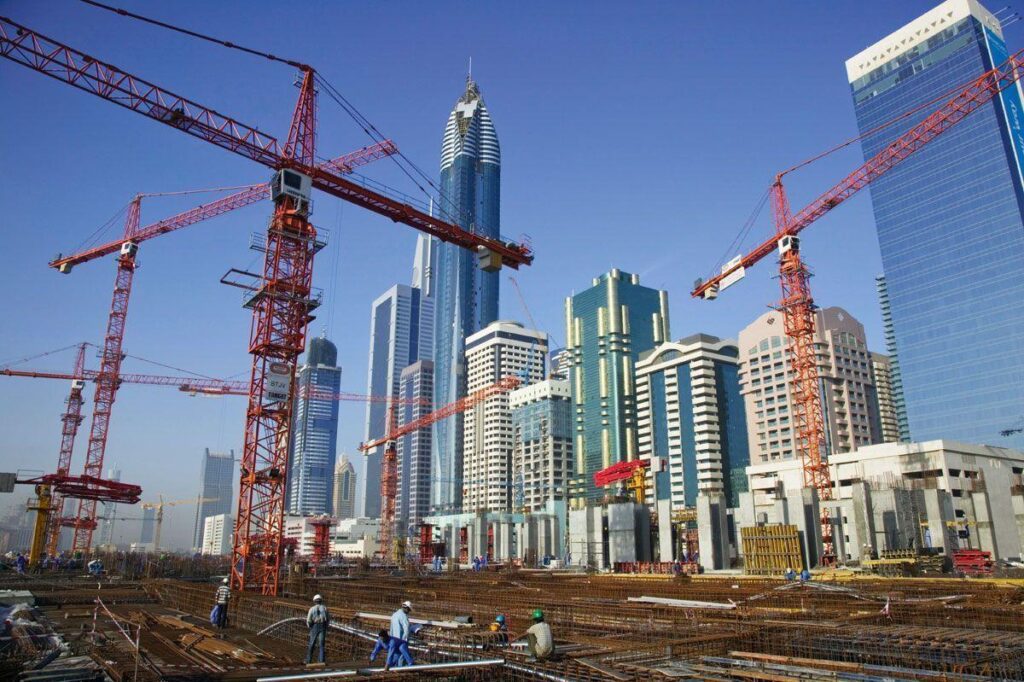Want to invest in off-plan property in Dubai? Discover how you can finance an off-plan purchase with a mortgage to take advantage of these new opportunities.
What is an off-plan property?
Dubai continues to be one of the most highly sought locations for real estate investments in the world. Anticipating continued demand from buyers, real estate developers are moving full-steam ahead with the construction of new developments. These properties that are in the pre-construction or under-construction stage are often referred to as off-plan properties.
Buyers and investors alike may seek out off-plan properties since they have the potential for a high return on investment (ROI). Developers offer these properties for lower prices, often between 10-30% lower than the price would be if the property were ready to move in. There’s room for significant price appreciation (an increase in property value) as the property is built and the surrounding community is developed. Upon property completion and handover (the move-in date), the owner can already benefit from the increased value of the property.
Investing in off-plan property can be a very profitable opportunity; however, there are fewer financing options available for properties that aren’t yet completed. Even if you’re familiar with the standard process of getting a mortgage, banks in the UAE have different restrictions and conditions for off-plan properties that you’ll want to carefully consider.
Can you finance an off-plan property with a mortgage?
Mortgage financing isn’t available in Dubai for off-plan properties that are still under construction. Banks will only provide buyers with a mortgage when they can hold the property papers as collateral. When a property is still being constructed, neither the bank nor the buyer can access the property papers as they are held by the developer. Buyers will need to finance the property purchase either partially or fully before the property is completed.
Some banks may provide financing for off-plan properties once they are completed, with a loan-to-value (LTV) ratio set at 50%. Say, for example, you want to buy an off-plan property with a purchase price of AED 1,000,000. This means that the bank will only provide you with financing for 50% of the price or AED 500,000 once the property is completed if you can put forth AED 500,000 or more from your own finances. Banks typically restrict the off-plan properties they will finance, sticking to the top developers and/or projects that they’ve already approved.
Many borrowers may not have the cash to fund 50% of the purchase price themselves. This is where other payment plans can come in handy.
Take advantage of on-handover payment plans
In order to help more borrowers afford an off-plan property purchase, developers have started offering their own payment plans. Two increasingly common types of developer-offered payment plans in the UAE are post-handover payment plans and on-handover payment plans.
Post-handover payment plans allow the buyer to pay back a portion of the property price after handover / completion within a specified timeframe (often over the course of a few years). You can check out a few
payment plans for projects from developers like MAG Property Development, Dar Al Arkan, and Danube Properties. However, buyers can’t take out a mortgage loan if they’ve opted into a post-handover payment plan. In this case, the developer agrees to extend the payment schedule past completion/handover, and will not release the title deed for the property until the buyer pays the full purchase price. The bank won’t finance a mortgage without having access to the property’s title deed for collateral.
On-handover payment plans also allow the buyer to pay a certain percentage of the property price before completion and after completion/handover. These payment plans can vary depending on the developer and the projects, with some common ratios offered such as 20/80 (20% paid during construction and 80% paid at handover), 40/60, 50/50, 60/40, and 70/30. The percentage paid during construction is due in installments upon reaching certain construction milestones. The remaining percentage is due when the property is completed and handed over.
Buyers can take out a mortgage loan to finance the percentage of the price that is due on handover/completion of the property. By making this payment, the borrower will have paid 100% of the purchase price. Instead of the title deed being transferred from the developer to the buyer, it will go straight to the bank and be held by them as collateral until the mortgage is fully paid off. It’s important to keep in mind that you’ll still have to meet the bank’s conditions and requirements to qualify for a mortgage loan. Even if you would have qualified for a loan initially (upon entering into the on-handover payment plan), it doesn’t guarantee that you’ll qualify after property handover if your financial situation has significantly changed.
Consider an equity release mortgage
For on-handover payment plans, you could also consider doing an equity release mortgage once the property is complete and handed over. Home equity is the share of the property that you own. With an equity release loan, you can borrow a percentage of the total property value, typically up to 85% if you’re a UAE national and 80% if you’re a resident expat. You can then use part of the released amount to put towards the remaining on-handover payment (eg. 50% of the purchase price) and even have remaining cash (up to 30-35% of the property value) to put towards other costs or debts. If the property value has increased since you purchased the property and began making payments, you may also be able to get an equity release loan based on the increased value.
Going forward
When it comes to buying an off-plan property in Dubai you’ll want to take some of the financing options above into consideration, specifically post-handover payment plans and equity release mortgages. It’s also helpful to familiarize yourself with the Oqood certificate, which is the equivalent of a title deed for off-plan properties. For real estate investors, you can learn how to optimize your rental yield when choosing a property or compare the pros and cons of short versus long-term rentals.




